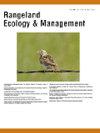牧民牧场流转的生态扶贫路径分析
IF 2.4
3区 环境科学与生态学
Q2 ECOLOGY
引用次数: 0
摘要
在牧区经济发展与生态保护矛盾日益突出的背景下,草原破碎化、生态退化等问题逐渐显现。这些问题严重制约了草原畜牧业的现代化进程。本文以内蒙古和新疆牧区427户牧民的实地调查数据为基础,构建了“牧场转移-牧场压力-牧场生态-牧民收入”的理论框架。运用多元线性回归和中介效应模型,探讨了草地流转对牧民收入的影响机制。本文还探讨了牧地压力的中介作用和生态退化的调节作用。研究发现,牧地流转能有效提高牧户收入。对于以牧场为租用地的农户来说,提高牧区收入的效果更为突出。牧场出租者通过劳动力转移实现了非牧区收入的增长。牧场压力充分中介了牧场流转对牧民家庭收入的正向影响。然而,生态变化对这一中介的负调节作用并不明显。进一步分析表明,牧民转移牧场的主要原因是亲属关系、地理邻近或政策引导。由于家庭关系或缺乏法律知识,牧民很少从生态退化的牧场获得报酬。同时,政府监管的缺失降低了违反合同的代价,导致牧场退化仍然增加收入的现象。研究揭示了草地牧区生态与经济相互作用的动力机制。建议建立智能监控系统,加强监管执法。这些措施旨在促进牧区草地资源的优化配置和可持续发展。本文章由计算机程序翻译,如有差异,请以英文原文为准。
Ecological Poverty Reduction Path Analysis of Herdsmen’s Rangeland Transfer
Against the backdrop of increasing contradictions between economic development and ecological protection in pastoral areas, issues such as rangeland fragmentation and ecological degradation have gradually emerged. These issues severely restrict the modernization process of rangeland animal husbandry. Based on field survey data from 427 pastoral households in Inner Mongolia and Xinjiang pastoral areas, this paper constructs a theoretical framework of “rangeland transfer - rangeland pressure - rangeland ecology - herdsmen’s income.” It employs multiple linear regression and mediation effect models to explore the influence mechanism of rangeland transfer on pastoral income. It also examines the mediating role of rangeland pressure and the moderating effect of ecological degradation. The study finds that rangeland transfer can effectively increase pastoral households’ income. For those who rent-in rangeland, the effect of boosting pastoral income is more prominent. Those who rent-out rangeland achieve nonpastoral income growth through labor transfer. Rangeland pressure fully mediates the positive effect of rangeland transfer on herdsmen’s household income. However, the negative moderating effect of ecological changes on this mediation is obscured. Further analysis shows that the majority of herdsmen transfer rangeland based on kinship, geographical proximity, or policy guidance. Herders rarely get paid by users for ecologically degraded rangelands because of family relationships or a lack of legal knowledge. Concurrently, the absence of government oversight lowers the price of contract violations, resulting in a phenomenon where rangeland degradation still increases income. The research reveals the dynamic mechanism of ecological and economic interaction in rangeland pastoral areas. It proposes establishing an intelligent monitoring system and strengthening regulatory enforcement. These measures aim to promote the optimal allocation of rangeland resources and sustainable development in pastoral areas.
求助全文
通过发布文献求助,成功后即可免费获取论文全文。
去求助
来源期刊

Rangeland Ecology & Management
农林科学-环境科学
CiteScore
4.60
自引率
13.00%
发文量
87
审稿时长
12-24 weeks
期刊介绍:
Rangeland Ecology & Management publishes all topics-including ecology, management, socioeconomic and policy-pertaining to global rangelands. The journal''s mission is to inform academics, ecosystem managers and policy makers of science-based information to promote sound rangeland stewardship. Author submissions are published in five manuscript categories: original research papers, high-profile forum topics, concept syntheses, as well as research and technical notes.
Rangelands represent approximately 50% of the Earth''s land area and provision multiple ecosystem services for large human populations. This expansive and diverse land area functions as coupled human-ecological systems. Knowledge of both social and biophysical system components and their interactions represent the foundation for informed rangeland stewardship. Rangeland Ecology & Management uniquely integrates information from multiple system components to address current and pending challenges confronting global rangelands.
 求助内容:
求助内容: 应助结果提醒方式:
应助结果提醒方式:


